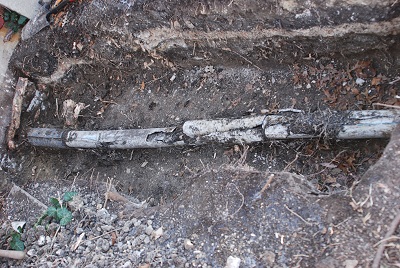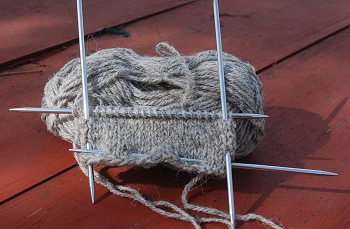Apr 30
Posted: under snippet, the writing life.
Tags: research, snippet, the writing life April 30th, 2015
NewBook is now over the hump in rough draft, having crossed the 60,000 word midpoint for this book. Its first 40,000 words or so have been reworked to improve characterization (which will lead to smoother progress later on. ) It’s unusual for me to have the mid-book slow-down due to characterization problems, but so it […] [...more]
NewBook is now over the hump in rough draft, having crossed the 60,000 word midpoint for this book. Its first 40,000 words or so have been reworked to improve characterization (which will lead to smoother progress later on. ) It’s unusual for me to have the mid-book slow-down due to characterization problems, but so it was this time. I expect another slow-down period transitioning over the 2/3 to 3/4 finished problem area, but–if I fixed the characterization problems–that one will be plot related and usually means a mistake made between now and then.
Read the rest of this entry »

Jan 26
Posted: under Background, Life beyond writing.
Tags: Background, Life beyond writing, research, weapons January 26th, 2015
David Watson, known in the SCA as Master Iolo, is a crossbow maker and experienced archer who has studied archery in warfare a long time, including visits to museums in the US and Europe. Here’s his take on the recently very popular YouTube videos of superfast shooting, including by people who insist that they’ve discovered […] [...more]
David Watson, known in the SCA as Master Iolo, is a crossbow maker and experienced archer who has studied archery in warfare a long time, including visits to museums in the US and Europe. Here’s his take on the recently very popular YouTube videos of superfast shooting, including by people who insist that they’ve discovered historical truths unknown to mere sport shooters. Read the rest of this entry »

Dec 20
Posted: under Background, the writing life.
Tags: Background, research, the writing life December 20th, 2014
Fantasy requires as much research as science fiction, but slanted somewhat differently. Or so it feels in my head, because the SF stories and the fantasy stories are situated in different places, not just fictionally, but psychologically. As it happens, I like both kinds of research (and I also like flying without wings, sometimes, as […] [...more]
Fantasy requires as much research as science fiction, but slanted somewhat differently. Or so it feels in my head, because the SF stories and the fantasy stories are situated in different places, not just fictionally, but psychologically. As it happens, I like both kinds of research (and I also like flying without wings, sometimes, as in the CHICKS stories–no research there, nuh-uh.) At any rate, I knew the new Vatta book would demand considerable research, despite being set in the same universe, because it’s set largely on planet. The nail-biting moments (well, most of them) will be down in the gravity well. And–just because it had to be, the story demanded it–much of it is in environments I have never personally experienced. (Of course, the space-based stories are in environments I’ve never experienced, but not even our current astronauts have either, so…there’s more wiggle room. Still research, but not likely to find someone who says “I served in an interstellar empire’s space navy and you’re completely wrong about the tactics of space warfare and not only that your conception of ship design is ridiculous.”
Read the rest of this entry »

Feb 28
Posted: under Background, Contents.
Tags: Background, craft of writing, research February 28th, 2014
Many forms of government have existed, and now exist, in our world…many forms of government can be depicted in fiction (including ones we haven’t yet seen in reality, like, um, a completely fair one.) Epic fantasy is frequently criticized for having monarchies and aristocracies (and the writers thereof accused of romanticism about the Middle Ages.) […] [...more]
Many forms of government have existed, and now exist, in our world…many forms of government can be depicted in fiction (including ones we haven’t yet seen in reality, like, um, a completely fair one.) Epic fantasy is frequently criticized for having monarchies and aristocracies (and the writers thereof accused of romanticism about the Middle Ages.) So a reasonable question is “Why are the political systems in Paksworld what they are?”
And the answer is, “I studied history at Rice under F.S. Lear and K.F. Drew and C. Garside. That explains everything.” And I see a row of stubbornly frowning faces in front of me, with thought balloons over their heads saying “That explains NOTHING.” And I’ll bet the stubborn faces would still have those thought balloons if I added, “OK, there was also prehistory and cultural anthropology…” Read the rest of this entry »

Feb 26
Posted: under Background, Contents, Life beyond writing.
Tags: Background, Life beyond writing, research, the writing life February 26th, 2014
The historians and archaeologists among you know that plumbing–its existence, variations, quality, and effect on human health (both good and bad)–is highly variable throughout history. Elaborate systems for providing fresh drinking water, for instance, existed in time (and within a short distance) alongside the simplest, least effective ways of getting water to drink and a […] [...more]
The historians and archaeologists among you know that plumbing–its existence, variations, quality, and effect on human health (both good and bad)–is highly variable throughout history. Elaborate systems for providing fresh drinking water, for instance, existed in time (and within a short distance) alongside the simplest, least effective ways of getting water to drink and a place to put your waste. This allows fantasy and science fiction writers to play with the co-existence of different kinds of plumbing, and different attitudes towards what we now call public health issues.
Read the rest of this entry »

Jan 30
Posted: under Background, Life beyond writing.
Tags: Background, Life beyond writing, research January 30th, 2014
There’s nothing like real life to give a writer an idea for a story or blog post. Like many people we sometimes have trouble with drains. Sometimes a lot of trouble with drains. [...more]
There’s nothing like real life to give a writer an idea for a story or blog post. Like many people we sometimes have trouble with drains. Sometimes a lot of trouble with drains.
 Read the rest of this entry »
Read the rest of this entry »

Jan 22
Posted: under Craft.
Tags: craft of writing, research January 22nd, 2014
Every writer needs to do research at one time or another, but it doesn’t have to be (should not be!) just hours in a library or staring at the computer. In both fiction and nonfiction, vivid writing that brings the reader the next best thing to “being there” requires research done right…from the best available […] [...more]
Every writer needs to do research at one time or another, but it doesn’t have to be (should not be!) just hours in a library or staring at the computer. In both fiction and nonfiction, vivid writing that brings the reader the next best thing to “being there” requires research done right…from the best available sources, in the most hands-on way possible. But most of us (nearly all) don’t have unlimited time and funds to spend on research. How can we use the resources we can afford in the best way? How should a writer tackle the research mountain when all he or she has is sneakers and day-pack?
Read the rest of this entry »

Jan 13
Posted: under Background, Life beyond writing, the writing life.
Tags: Background, Life beyond writing, research, the writing life January 13th, 2014
The Herdwick yarn I bought is exactly what I hoped for–a yarn that belongs in a fantasy novel, in that its feel (like the breed itself) is old, traditional, and suits a rugged pre-industrial setting. Here’s a small swatch knitted on US #5, (3.75mm) needles, from the Aran-weight, light-colored yarn. I’m getting five stitches per […] [...more]
The Herdwick yarn I bought is exactly what I hoped for–a yarn that belongs in a fantasy novel, in that its feel (like the breed itself) is old, traditional, and suits a rugged pre-industrial setting. Here’s a small swatch knitted on US #5, (3.75mm) needles, from the Aran-weight, light-colored yarn. I’m getting five stitches per inch.

Read the rest of this entry »

Nov 22
Posted: under snippet.
Tags: research, snippet November 22nd, 2013
As I’ve mentioned before, late in a project almost anything can be a spoiler–so many clues, so many established patterns missing just one piece. Early on, all roads are open, but by now, many of them, the ways not taken, have been left behind. So this may be a spoiler for some, though I’ve tried […] [...more]
As I’ve mentioned before, late in a project almost anything can be a spoiler–so many clues, so many established patterns missing just one piece. Early on, all roads are open, but by now, many of them, the ways not taken, have been left behind.
So this may be a spoiler for some, though I’ve tried not to let it be. If you are a reader who hates knowing anything before its time, then don’t read below the break. Stop now. Turn around, don’t look back, ignore the rest of this. For those who proceed, please do your speculating about where in the book this is, or what character you might know, in the Speculation Space. Read the rest of this entry »

Oct 18
Posted: under Background, Contents, Life beyond writing.
Tags: Background, Contents, Life beyond writing, research October 18th, 2013
So…Paksworld’s northern kingdoms are more like Europe north of the Alps, in terms of what they grow and eat, and Aarenis is more like the Mediterranean countries. But there are variations. Paks’s family had a small amount of land under plough, for grain and the few vegetables they grew; they also harvested field herbs, wild […] [...more]
So…Paksworld’s northern kingdoms are more like Europe north of the Alps, in terms of what they grow and eat, and Aarenis is more like the Mediterranean countries. But there are variations. Paks’s family had a small amount of land under plough, for grain and the few vegetables they grew; they also harvested field herbs, wild berries, and some wild grains. The nearest mill was a considerable distance away, so her family ground grain to make bread in hand mills (stone.) Grain was also cooked into a mush, flavored with herbs and sometimes meat. They were lucky in having good-quality hand mills that didn’t put a lot of stone dust in the meal, so they didn’t have their teeth ground down. Read the rest of this entry »



